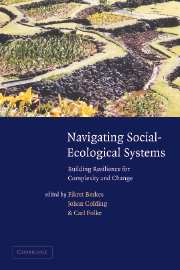Book contents
- Frontmatter
- Contents
- List of contributors
- Preface
- Acknowledgements
- Foreword: The backloop to sustainability
- 1 Introduction
- Part I Perspectives on resilience
- Part II Building resilience in local management systems
- Part III Social-ecological learning and adaptation
- Part IV Cross-scale institutional response to change
- Index
Part II - Building resilience in local management systems
Published online by Cambridge University Press: 13 August 2009
- Frontmatter
- Contents
- List of contributors
- Preface
- Acknowledgements
- Foreword: The backloop to sustainability
- 1 Introduction
- Part I Perspectives on resilience
- Part II Building resilience in local management systems
- Part III Social-ecological learning and adaptation
- Part IV Cross-scale institutional response to change
- Index
Summary
In dealing with multiple-scale systems, a useful place to start is local management systems. In the development of common property theory in the 1980s and the 1990s, the local or the community level received by far the greatest part of research attention. This was not because the local level was necessarily perceived as the most important scale of organization, but because social–ecological systems at this level provided a ‘laboratory’ in which principles can be generated, before they can be tested in the real world of external drivers and cross-scale interactions.
When analyzing resilience, again it makes sense to address the local level and build linkages to other scales. This approach helps simplify the analysis of change and the response to change. For example, it is easier to deal with the response and adaptation to one kind of perturbation (e.g., major hurricane), than to a perturbation complicated by an external driver (e.g., the collapse of commodity markets that previously supported an agricultural society). Also, it is easier to deal with the comparison, for example, of two local–regional forest management systems subject to the same forces of social and economic change over a period of time, than a larger system that may have come under other stresses as well. Resilience thinking helps the researcher to look beyond the static analysis of social systems and ecological systems, and to ask instead questions regarding the adaptive capacity of societies and their institutions.
- Type
- Chapter
- Information
- Navigating Social-Ecological SystemsBuilding Resilience for Complexity and Change, pp. 115Publisher: Cambridge University PressPrint publication year: 2002

